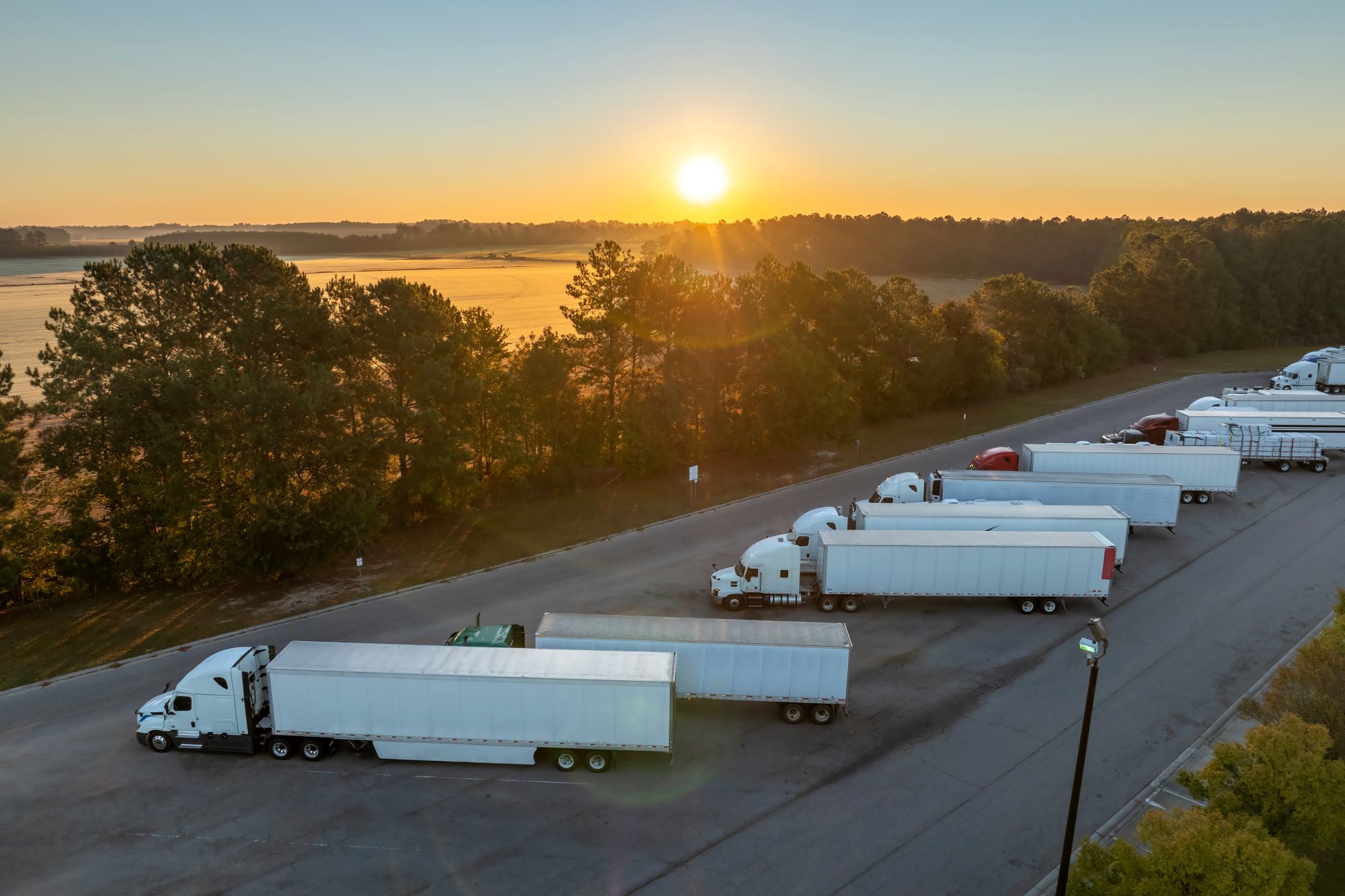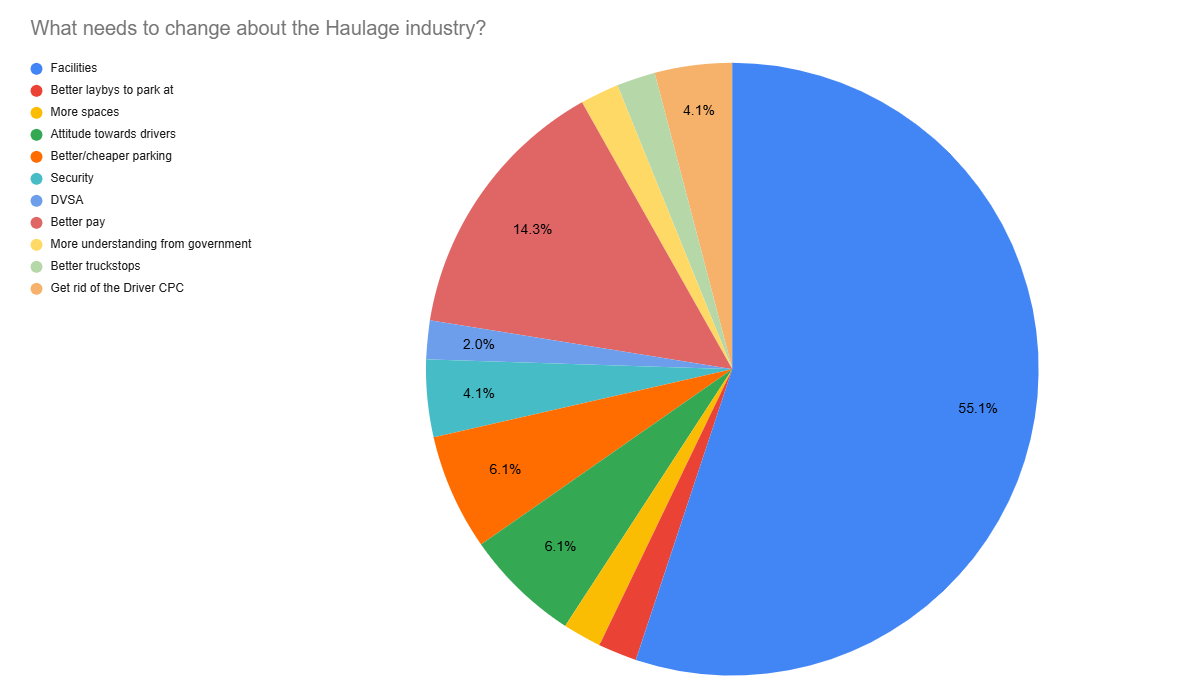
Susie Jones
Водії вантажівок закликають до реформування галузі
Створено: 05.02.2025
•
Оновлено: 05.02.2025
Наразі жінки-водії вантажівок у Великій Британії складають лише 1% від усіх водіїв - цифра, яка зросла на 144% за останнє десятиліття, оскільки впроваджується все більше ініціатив, спрямованих на заохочення різноманітності та подолання дефіциту водіїв.
У статті [Fleetpoint] (https://www.fleetpoint.org/fleet-management-2/encouraging-more-women-to-join-the-road-transport-industry/) описано багато способів залучення більшої кількості жінок у галузь:
Створення сприятливого та доброзичливого робочого середовища.
Модернізація інфраструктури та зручностей.
Гнучкий та дружній до сім'ї графік роботи.
Побудова чітких шляхів для кар'єрного зростання.
Незважаючи на це, водії в [соціальних мережах] (https://www.facebook.com/photo/?fbid=988050383364634&set=a.482170237285987&locale=en_GB) стверджували, що ці давні проблеми в галузі повинні бути вирішені для всіх, перш ніж запроваджувати нові ініціативи для подолання дефіциту водіїв.
Нестача водіїв - де зараз знаходиться галузь?
Дефіцит водіїв був постійною проблемою для транспортної галузі, але після COVID-19 та Brexit він досяг критичного рівня. У 2024 році в Європі, Норвегії та Великобританії не вистачало понад 233 000 водіїв вантажівок, а до 2028 року ця цифра перевищить 745 000 через старіння робочої сили.
Галузь все ще бореться з наслідками і працює над впровадженням нових ініціатив, спрямованих на заохочення різноманітності, покращення умов праці та подолання дефіциту робочої сили.
Уряд здійснив приблизно [33] (https://www.gov.uk/government/topical-events/hgv-driver-shortage-uk-government-response/about#:~:text=We%20extended%20dangerous%20goods%20(ADR,to%20take%20refresher%20training%20now.) заходів для вирішення проблеми нестачі водіїв вантажівок у Великій Британії. В тому числі, але не обмежуючись цим:
Підвищення ефективності існуючих ланцюгів поставок.
Надання підтримки та навчання для нових водіїв вантажівок.
Розширення можливостей тестування водіїв вантажівок.
Удосконалення процесів ліцензування.
Покращення умов.
Забезпечення стабільності ланцюга постачання палива.

Що потрібно змінити? Водії мають сказати своє слово.
49% водіїв у соціальних мережах стверджували, що зміни мають бути впроваджені незалежно від статі, а 27% жінок-водіїв вантажівок погодилися, що галузь має розвиватися для всіх. 24% заявили, що робота більше не є привабливою, підкреслюючи необхідність змін у галузі. Отже, що водії хочуть бачити зміненим?
Зручності.
55% хотіли б, щоб умови були покращені для всіх:
"Потрібні кращі умови і краще лікування, і крапка. Уся галузь перебуває в руїнах, і з нами погано поводяться".
"Зручності жахливі для всіх водіїв, чоловіків і жінок".
У листопаді 2024 року опитування [Transport Focus] (https://www.britsafe.org/safety-management/2024/uk-truckers-why-more-action-is-needed-to-make-their-working-lives-safer-and-healthier#:~:text=Improving%20roadside%20facilities&text=Drivers%20have%20long%20been%20telling,asked%20expressed%20dissatisfaction%20with%20both.) показало, що дві третини водіїв були незадоволені умовами на зупинках для вантажівок - брудні зручності, погане харчування та відсутність соціального простору викликали значні проблеми.
Уряд і галузь перевезень вжили значних заходів, інвестувавши 14 мільйонів фунтів стерлінгів у розвиток інновацій та покращення умов праці.
У жовтні 2024 року 23 переможці отримали до 4,5 мільйонів фунтів стерлінгів на модернізацію своїх автостоянок. Модернізація включатиме нові душові кабіни, ресторани та посилені заходи безпеки для більшого спокою водіїв. Крім того, в рамках проекту буде створено близько 430 паркувальних місць для великовантажних автомобілів.
Заплати.
Друге місце в списку посідає підвищення заробітної плати. 14% водіїв стверджують, що підвищення заробітної плати заохочувало б більше людей працювати в галузі:
"Зробіть його привабливим для всіх, підвищуйте зарплати".
Підвищення заробітної плати буде коштувати лідерам галузі значних витрат. Якби середня зарплата водія вантажівки зросла відповідно до національного прожиткового мінімуму, оператори автопарків могли б отримати додаткові 1,5 мільярда фунтів стерлінгів на рік.
Незважаючи на це, інвестиції покращать показники утримання кадрів, зменшать витрати на підбір персоналу та знизять витрати на навчання. Підвищення заробітної плати не лише зробить професію більш привабливою для нових кандидатів, але й визнає критично важливу роль водіїв у підтримці ланцюга поставок.
Ставлення до водіїв
З роками громадська думка про водіїв вантажівок значно змінилася. Життя далекобійників часто романтизували у фільмах та популярних ЗМІ, що змусило багатьох повірити, що їм легко працювати. Однак це також представляло їх як працьовитих героїв - образ, який з часом погіршився.
Наприкінці 20-го століття сприйняття змінилося, оскільки умови праці стали жорсткішими, а про водіїв вантажівок склалися несправедливі стереотипи - часто через спотворення інформації в ЗМІ, а іноді й через недосвідчених водіїв. Ці негативні стереотипи були послаблені під час пандемії COVID-19, коли громадська думка про водіїв вантажівок зросла.
Сьогодні до водіїв-далекобійників ставляться з повагою, проте галузь все ще страждає від негативних стереотипів і ставлення. Саме тому 6% водіїв хотіли б бачити зміни:
"Згадуючи Ковід, нас вважали героями, але потім все повернулося на круги своя. Не дивно, що нинішні водії, чоловіки та жінки, хочуть покинути галузь. Вони втомилися від недбалого ставлення, з яким стикаються щодня".
"Хотілося б, щоб до тебе не ставилися як до покидька".
Останніми роками розвиток соціальних мереж почав кидати виклик негативним стереотипам і змінювати їх. Багато водіїв використовують такі платформи, як TikTok та Instagram, щоб поділитися думками про свою роль, розвіяти хибні уявлення та заслужити повагу з боку тих, хто не працює в цій галузі.
Відгуки свідчать про нагальну потребу галузі перевезень впроваджувати зміни для залучення та утримання існуючих і нових водіїв. Недостатня представленість жінок залишається значною проблемою, тому інвестиції в об'єкти, що відповідають їхнім потребам, мають вирішальне значення. Однак ці інвестиції повинні бути інклюзивними і приносити користь всій робочій силі.

В яких країнах не вистачає водіїв вантажівок?
Найбільше постраждали країни Європи, де багато автотранспортних компаній не можуть розширити свій бізнес, оскільки не можуть знайти кваліфікованих працівників.
У Європі старіє популяція водіїв вантажівок, середній вік яких становить 47 років (https://www.iru.org/news-resources/newsroom/half-european-truck-operators-cant-expand-due-driver-shortages#:~:text=The%20EU%2C%20Norway%20and%20the,an%20average%20age%20of%2047.). Третина водіїв вантажівок старше 55 років і, як очікується, вийдуть на пенсію в найближчі десять років. Крім того, менше 5% водіїв вантажівок в Європі молодші 25 років, що підкреслює прогалину, яка залишиться після виходу на пенсію старіючої робочої сили.
Чи існує день вдячності водіїв вантажівок?
День водіїв вантажівок [HGV Drivers Day] (https://https://snapacc.com/newsroom/hgv-drivers-day-2025-giving-truckers-a-voice/) відзначається 22 січня і був заснований компанією NN1 Personnel. Цей день покликаний вшанувати водіїв вантажівок і все, що вони роблять для економіки та суспільства.
Які перспективи автотранспортної галузі на 2025 рік?
З нашого блогу [The Road Ahead for 2025] (https://snapacc.com/newsroom/the-road-ahead-for-2025-truck-industry-trends-to-expect/), ми очікуємо, що цього року в галузі вантажоперевезень буде відбуватися наступне:
Використання переваг штучного інтелекту.
Подолання гендерного розриву та дефіциту водіїв.
Сприяння екологізації промисловості.
Збільшення міжміських перевезень.


